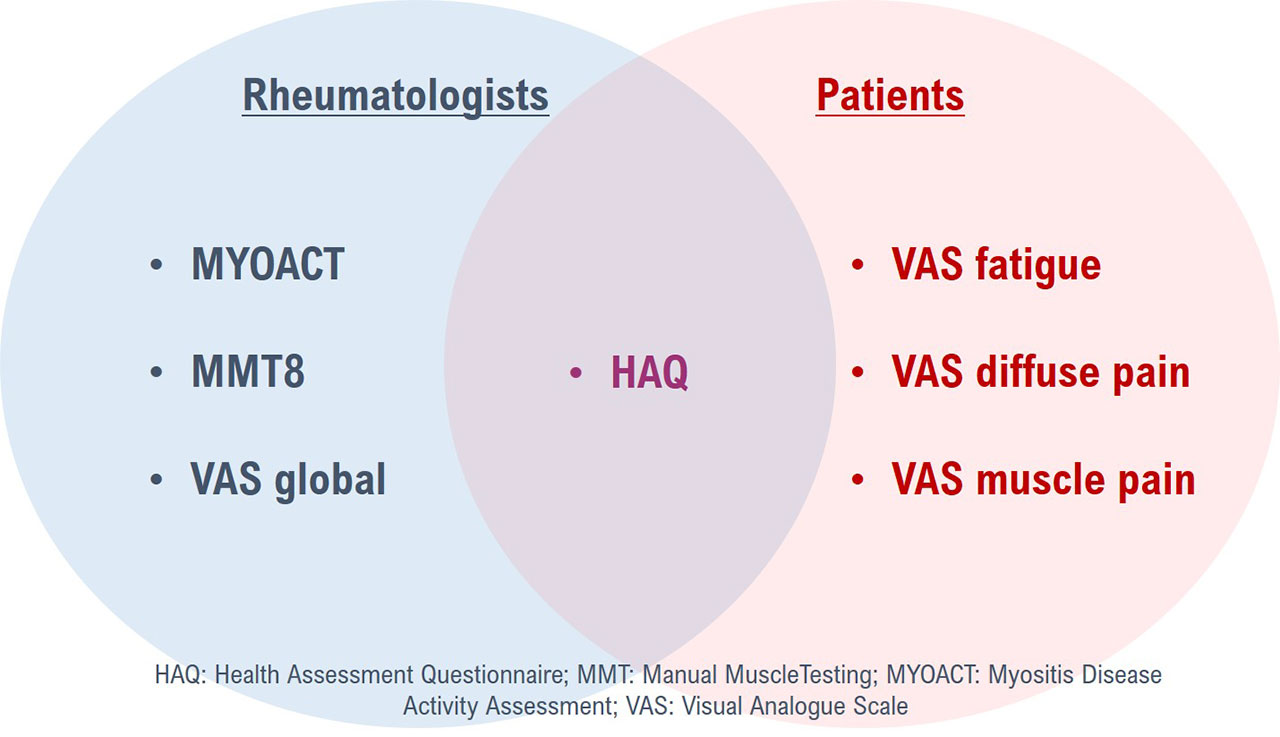Session Information
Date: Tuesday, November 12, 2019
Title: Patient Outcomes, Preferences, & Attitudes Poster II: Patient Preferences, Beliefs, & Experiences
Session Type: Poster Session (Tuesday)
Session Time: 9:00AM-11:00AM
Background/Purpose: Treat-to-target (T2T) strategy has become the best approach to treat several rheumatic disorders. However, most targets are only based on specialists’ opinions, which may not reflect exactly the main patients’ concerns during treatment. There is evidence that switching to a more patient-centered healthcare system seems to enhance treatment adherence and improve outcomes. Therefore, the purposes of this research were: a) to assess the concerns of the patients with systemic autoimmune myopathies (SAMs) during follow-up and compare to the rheumatologists’ concerns; b) to gather patients’ and physicians’ concerns to develop a SAMs outcome standard set.
Methods: From 2018 to 2019, total of the 93 consecutive adult patients with SAMs (49 dermatomyositis and 11 polymyositis – EULAR/ACR 2017, and 33 anti-synthetase syndrome – Connors et al., 2010) and 51 rheumatologists from a tertiary center were invited to answer a standardized questionnaire. Initially, an open questionnaire was applied in order to assess unbiased concerns of both groups. Thereby, the top 10 answers were selected and applied a multiple-choice questionnaire, inquiring the top 3 major concerns. Answers of each group were plotted into charts and frequencies were compared. The agreement rate was calculated by the sum of lowest frequency of each concern. Concerns were gathered in a SAMs outcome standard set, following the methodology proposed by the International Consortium for Health Outcomes Measurement (ICHOM). We also evaluated if the patients’ concerns were associated with any current clinical features, previous manifestations or comorbidities.
Results: The top three concerns raised among the patients were: to avoid side effect of medication (51%), to improve muscle weakness (49%) and to prevent loss of functionality (35%). The top three concerns among rheumatologists were: prevent loss of functionality (71%), ensure quality of life (63%) and achieve disease remission (63%). The agreement rate between both groups was 41%.The patients’ concerns that rheumatologists did not mention were respectively the improvement of: muscle pain (33% vs. 0%, P=0.001), diffuse pain (25% vs. 0%, P=0.001), skin lesions (23% vs. 0%, P=0.001) and fatigue (18% vs. 0%, P=0.001) – all symptoms related worries. The rheumatologists’ concerns that patients did not mention were respectively the: achievement of disease remission (63% vs. 0%, P=0.001) and prednisone dose (0% vs. 22%, P=0.001). The concerns of pain and fatigue were not associated with other diagnosis such as fibromyalgia or depression/anxiety. Gathering both point of view, we developed a SAMs outcome standard set (Figure 1).
Conclusion: Even though functionality and muscle weakness are still major concerns for physicians and patients, there are additional patients’ concerns that should be assessed routinely during SAMs treatment and follow-up. Patients consider that controlling pain and fatigue are important outcomes to be pursued in SAMs and rheumatologists should be aware of these to provide a better assistance and ensure treatment adherence.
To cite this abstract in AMA style:
Bertoglio I, Abrahão G, Remião Ugolini-Lopes M, Souza F, Miossi R, Shinjo S, Bonfa E. Gathering Patients’ and Physicians’ Perceptions to Improve Outcomes in Systemic Autoimmune Myopathies [abstract]. Arthritis Rheumatol. 2019; 71 (suppl 10). https://acrabstracts.org/abstract/gathering-patients-and-physicians-perceptions-to-improve-outcomes-in-systemic-autoimmune-myopathies/. Accessed .« Back to 2019 ACR/ARP Annual Meeting
ACR Meeting Abstracts - https://acrabstracts.org/abstract/gathering-patients-and-physicians-perceptions-to-improve-outcomes-in-systemic-autoimmune-myopathies/

